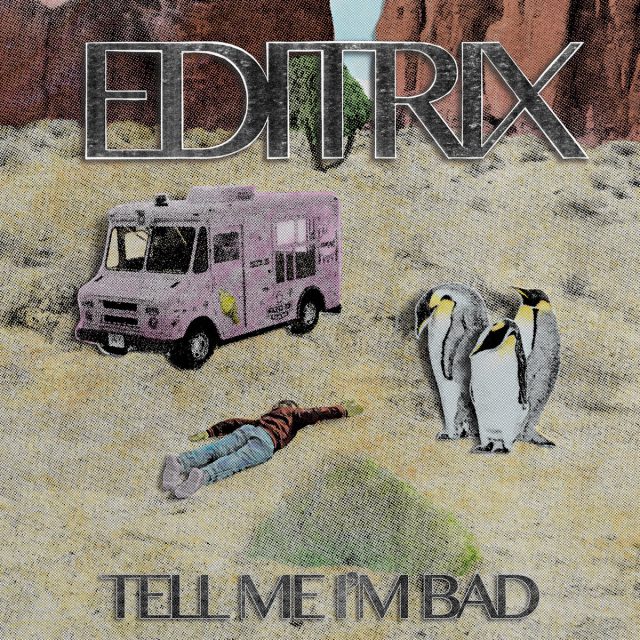THE EDITED PRESS RELEASE: “Rather than get stuck in the miasma of genre definitions while the world burns, Editrix have crafted nihilistic anthems that embrace familiar and fun pop songwriting even as it crumbles to bits. The Western Massachusetts trio’s debut album Tell Me I’m Bad darts and tumbles between apocalyptic love song and ethical quandary, playfully picking from and decimating influences ranging from Anthony Braxton to Captain Beefheart along the way.
Wendy Eisenberg (guitar/vocals), Josh Daniel (drums), and Steve Cameron (bass) formed Editrix in early 2018 as a way to explore the outer edges of the rock pantheon beyond their respective bands. Rather than bridging the gaps between party rock, noise, jazz, and prog, the resultant “avant butt rock” rabble-rousing moves in pocket dimensions between them. “We’re a bunch of sidepeople that decided to form ourselves into a compositional experiment,” Eisenberg says. “We all love different music and play in different bands, but our collaborative songwriting has trended towards elaborating on pop forms. We want to annihilate indie rock.”
Album highlight Chelsea shares the band’s explosive embrace, as if they’re approaching you, smiling maniacally, their energy bouncing off myriad funhouse mirrors. At first glance, Eisenberg’s crystalline voice floats sweetly over the band’s roaring start-stop trilling — a thrumming groove somewhere between Deerhoof and Lightning Bolt. A closer look, though, would reveal the lyrics’ layered critique of well-meaning leftism. “Chelsea lives at the mall/ Votes with her cash, she’s an informed consumer,” Eisenberg calls. But nothing’s quite that simple, and while good intentions aren’t enough, a broken system might not allow for much more. “How could I ask her to be different/ I’m not trying,” they follow, before reeling off another cycle of needling guitar.
Recorded at Bluejay Studios in Massachusetts, Tell Me I’m Bad excels at heady duality because of Editrix’s ability to blend sublime technical ability with straight-to-the-nerves performance. Eisenberg’s improvised music released on the label of legendary jazz mastermind John Zorn would tie to that raw nerve immediacy, but then so too would Cameron’s work with speed metal outfit Tortured Skull and Daniels’ drumming for Landowner’s post-punk puzzles. “It’s exciting to see what comes from writing together and everybody adding their little spice as opposed to writing alone,” Cameron says. Recorded live over the course of two days with very few overdubs, the record presents a band with a clear view of its sublime range. “It’s a very homegrown experience,” Eisenberg says. “We enlisted friends to record, master, and produce the artwork, and pretty much produced it ourselves. We had fun together and wanted it to sound that way.”

That sense of conversation is the beating heart of Editrix, allowing their songs to take hairpin turns at a moment’s notice, the three musicians wound tightly together even when their compositions threaten to unravel into a raucous sprawl. The opening title track sets that tone perfectly, Daniel’s double bass drum hits rampaging forth like the hooves of some sort three-headed creature. Later, his rapid shifts from chittering hi-hat to loping tom rolls underscore Eisenberg’s slippery upward-leaning vocals — each phrase like a raindrop somehow flying back up into the sky. “Tell me I’m good/ And I will not believe you,” they sing, Cameron chording his bass underneath.
Elsewhere, The History of Dance feels like the spiritual successor to The B-52s’ Dance This Mess Around set for the apocalypse, its surreally sweet insistence on the fun of dancing at parties punctuated by head-banging bass riffing an unhinged guitar solo. She Wants To Go and Party similarly upends its own simple premise, Eisenberg’s frenetic guitar heightening the wide-eyed anxiety until reaching a cartoonish glee, a grunty caveman voice repeating the word “party” after the last word of the title.
Even the darker themes balance their weight with the unadulterated joy of the surprising musical twists and turns. “We write music that is fun to play together and we amuse ourselves by tweaking popular music ideas and forms,” Daniel says. Bad Breath tears apart an evangelical seatmate that wouldn’t leave Eisenberg alone on a flight, as Cameron’s bass pops in and out of the mix like a sewing needle. Torture looks at the corrupting shock of images of torture from the Iraq war, but feels equally self-critical of the instinct to wish those images away — rather than the acts themselves. And yet, the track also reaches the heights of Eisenberg’s falsetto, soft and fluttery as the track fades away.
Editrix leap in hyperdrive around the musical galaxy to get a million different views of the nature of relationships in a self-destructing late capitalist society. “When we write, we’re trying to examine the idea from as many different angles as can fit in the song,” Eisenberg says. “It’s all about love at the end of this world, desire under broken forms.”









































